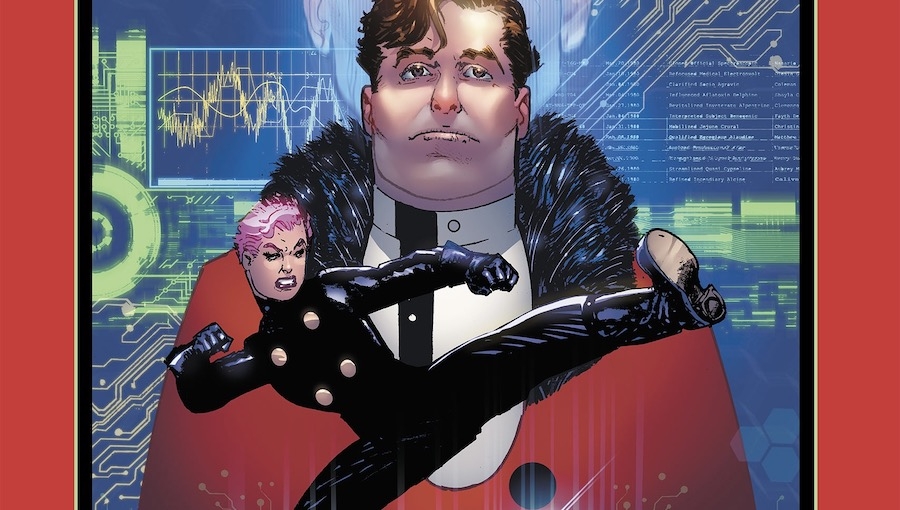The following is an interview with author Nicholas Mennuti (Weaponized) and legendary artist Howard Chaykin (Batman, Green Lantern Corps, Superman Unchained) regarding the recent release of the illustrated sci-fi novella, Scarp, from NeoText. In this interview, Fanbase Press Editor-in-Chief Barbra Dillon chats with Mennuti and Chaykin about their shared creative process in bringing the story to life, why NeoText serves as the perfect home for the story, and more!
Barbra Dillon, Fanbase Press Editor-in-Chief: Congratulations on the release of Scrap! For those who may be unfamiliar, how would you describe the story’s premise and what was its inspiration?
Nick Mennuti: Scrap tells the story of Travis Schrader, a man who has lost the script on his life, who has gone astray, and absent-mindedly wandered into a temporary position as a night watchman-quasi-engineer at an enormous data storage center in Kansas.
One evening, while on the job, he is kidnapped from the present, dragged into the future, and informed that he has been sold to a corporation that intends to utilize him for their own ends, because his life can be manipulated without setting off a butterfly effect that could reverberate and influence world events. Travis has allowed himself to become that insignificant.
The initial inspiration for Scrap came from NeoText founder John Schoenfelder who basically had Travis’ dilemma – someone who has allowed themselves to dwindle into entropy and thus effectively become a non-entity to current events – and was looking for a story to house around that conflict. I immediately sparked to the idea because Travis’ core problem was so emotionally clear and resonant, that you could automatically see his journey.
BD: Nicholas, you are no stranger to collaboration, having co-written your first novel with David Guggenheim. What can you tell us about your shared creative process in working with Howard to bring the story to life visually?
NM: I’ve been lucky, haven’t I? In general, when collaborating, I look at my role as providing the creative room for my partner to be at their best. And, of course, that varies from project to project.
In the case of Howard, I obviously knew how brilliant he was, so my job was to provide him a text which would spark his vision, to give him the words and narrative moments he needed to create the singular and ground-breaking art he’s famous for providing.
BD: Howard, you are a master of sequential art, having worked for countless comic book publishers on some of the most well-known titles. Do you feel that there is a different approach required for illustrating imagery within this novella as compared to sequential storytelling?
Howard Chaykin: Scrap was an opportunity to deep dive into a modern take on EC’s Picto-Fiction, a hybrid that was way ahead of its time. And Don Cameron’s digital rendering took my work to a whole new level.
BD: What makes NeoText the perfect home for Scrap?
NM: Honestly, NeoText is the only home for Scrap.
First, no other publisher would have attempted it in this form. John had a bold character he wanted to develop, and then he trusted Howard and I to match his boldness both textually and aesthetically. Howard and I being paired together on Scrap isn’t an accident either. NeoText is highly thoughtful and deliberate when weighing writer and artist collaborations.
Also, NeoText’s commitment to using a serialized format that allows stories – whether fiction or non-fiction — to unfold at a natural pace, as opposed to tying creators down to a particular format and genre-dependent length, makes them unique.
Finally, in my personal experience, NeoText creates an ideal space for creators to feel free to explore and develop their subject matter. It is very much a “no judgments” zone. You will rarely, if ever, hear the word: ”no.” There’s a company-wide ethos of pushing for excellence and if that means traveling down a sometimes crooked path to find the right course, no one panics, which as a creator is both a rare and heartening way to work.
BD: At Fanbase Press, our #StoriesMatter initiative endeavors to highlight the impact that stories can have on audiences of various mediums. How do you feel that Travis’ story will connect with and impact readers?
NM: At the risk of sounding either apocalyptic or pretentious, I think Travis is all of us, because nearly everyone exists at the mercy of corporations, and their relentless inhuman drive toward endless growth. Scrap is very much a cautionary tale — even though it is riddled with action and satire.
Travis exists in a present much like our own, in which the vast majority live in some form of economic precarity, and everyone is subject to corporate biopolitics, whether they know it or not. The predicted future of Scrap is, in my opinion, where this unchecked oligarchic power will inevitably lead. It’s there in the title. To the corporation, we are all potential scrap, free to be used and reused into perpetuity, until we’ve been drained of any remaining use value.
BD: Are there any upcoming projects on which you are currently working that you would like to share with our readers?
NM: Excellent question! Hopefully soon, I’ll be working on the next installments of Scrap and continue shuffling Travis between the present and future. I already have the next two installments laid out.
In the interim, I’m working on my next novel, a sort of esoteric Western, which I’ve been working on intermittently, very intermittently, for the last few years.
BD: Lastly, what is the best way for our readers to find more information about Scrap and your other work?
NM: Scrap is featured on the NeoText website (https://neotextcorp.com/), where you can also read my film criticism, with more to follow. For updates on my other work, the best place to keep updated is my Twitter account — @NMennuti.

